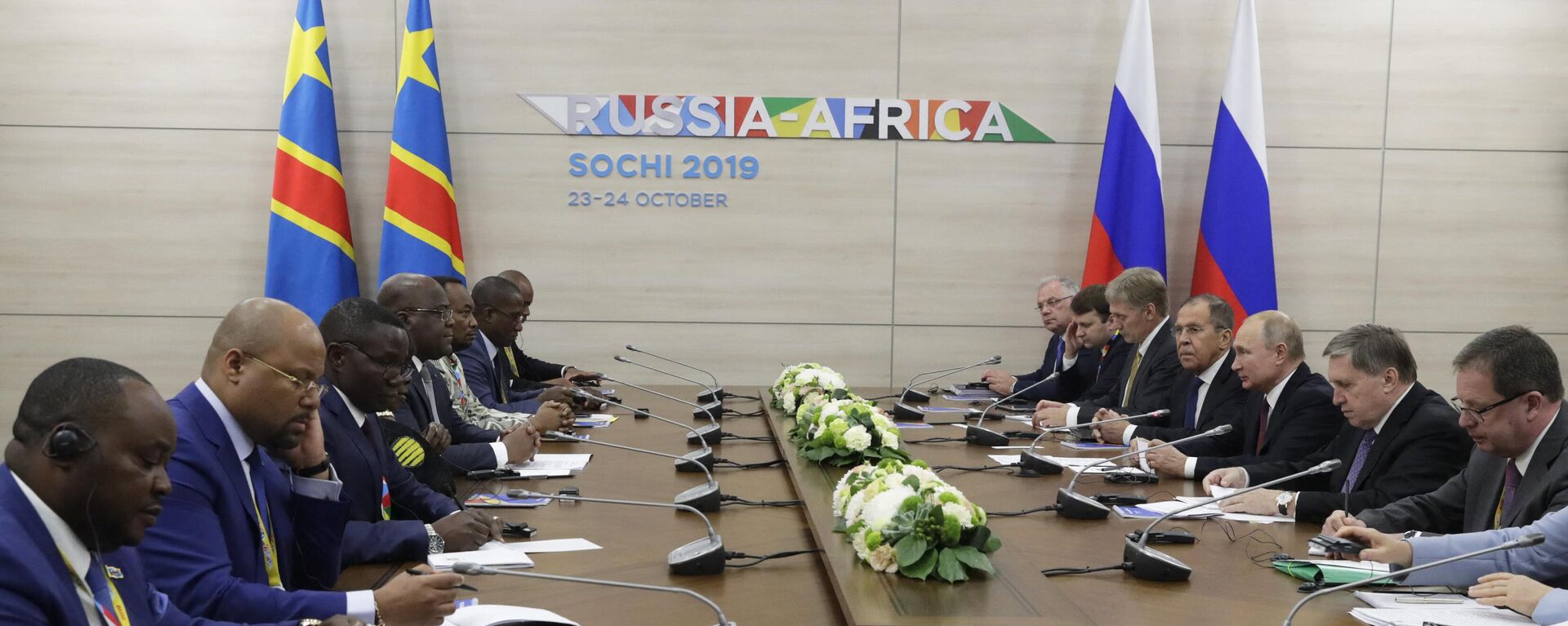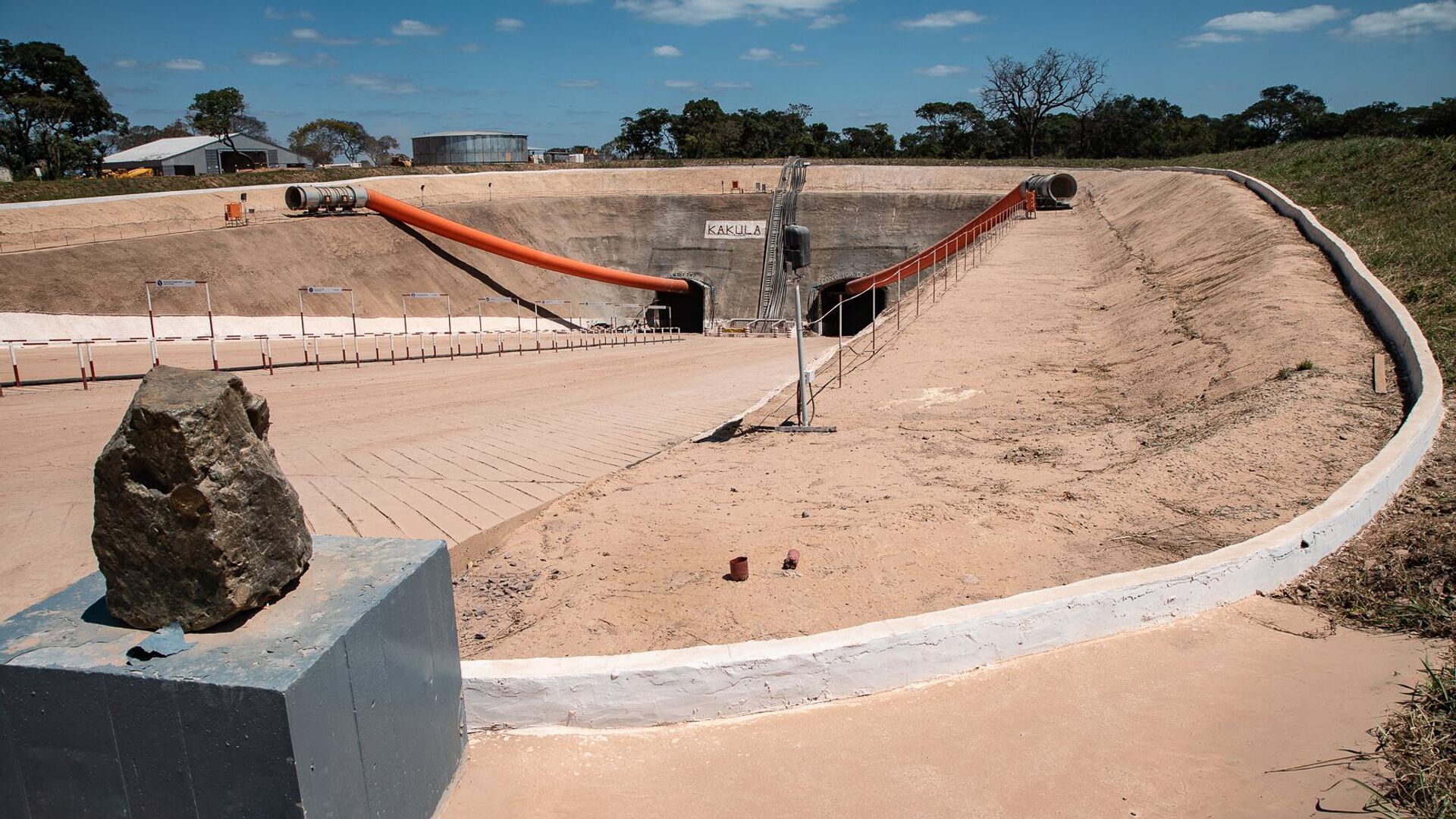https://sputnikglobe.com/20230208/dr-congo-reportedly-soon-to-start-new-exploration-for-green-metals-president-says-1107070439.html
DR Congo Soon to Start New Exploration for 'Green' Metals, President Says
DR Congo Soon to Start New Exploration for 'Green' Metals, President Says
Sputnik International
The Democratic Republic of the Congo is set to become the world's major supplier of metals for the green energy transition, and that implies the launch of new exploration for such metals as nickel and chrome.
2023-02-08T11:50+0000
2023-02-08T11:50+0000
2023-02-08T12:07+0000
africa
central africa
drc
mining
chrome
nickel
https://cdn1.img.sputnikglobe.com/img/07e7/02/08/1107069973_0:93:1773:1090_1920x0_80_0_0_88ba3a8968e989376513619efb9c74e5.jpg
The DR Congo is set to become the world's major supplier of metals for the green energy transition, and that means that new exploration for such metals as nickel and chrome will be launched, according to the country's President Felix Tshisekedi.Speaking to reporters on the sidelines of the Investing in African Mining Indaba conference in Cape Town, South Africa, the president noted that the exploration for these two minerals is about to start "in the next few days" in the Kasai region, in the southern part of the country. He highlighted that the DRC is inviting new partners to join exploration and invest in cobalt, tantalum, tin and lithium processing.He stated that the country has recently created a national geological service that is intended to oversee the exploration. He also mentioned that the new investment will be attracted to the country as the government is taking measures aimed at improving business and regulatory environment. As an example, he noted that the country could offer various incentives such as the creation of a special economic zone around lithium deposits in the south-eastern part of the DRC. The DRC is responsible for more than two-thirds of the mineral cobalt essential in the manufacture of batteries, and is one of the world’s biggest copper producers, according to the US international trade administration. In 2020, the country became the world’s largest cobalt miner with a production of 95,000 tons, or approximately 41 percent of the world’s cobalt. The country also has deposits of other minerals including lithium, graphite and manganese. However, as stated by the president, less than 20 percent of the country has been explored. Therefore, the DRC needs support of international community in terms of financing and exploration. Tshisekedi noted that even though the country is rich in minerals, it still remains one of the world's poorest countries. According to the UN, very little of the revenues from natural resource exploitation has contributed to the overall development of the DRC or to the improvement in the living standards of its inhabitants. In this regard, the president emphasized that potential investors and miners are expected to take into account the interests of the Congolese and ensure people also benefit from their activities. It means, he elaborated, that the miners should buy insurance from companies registered in the country and negotiate with local communities while implementing their exploration projects.President Tshisekedi has recently criticized a $6.2Bln minerals-for-infrastructure deal with China, stating that the central African nation, as the world’s biggest producer of key battery metals, hasn’t benefited from the contract. The deal, signed in 2008, stipulated that Chinese companies invest $3.2Bln in a copper-cobalt mine and another $3Bln in infrastructure construction. The DRC government claimed that most of the minerals end up in China, even though the latter has released less than a third of the funds designated for infrastructure. The discussions, intended to improve the deal, have been going on for more than a year. The review of the contract is part of the president's campaign to ensure that the DRC gets paid for providing its natural riches.The ongoing transition to green energy technology is a main driving force of demand for metals used in batteries, such as nickel, cobalt and lithium, as well as in solar components and wind turbines. As mine output in recent years has been limited, prices for the commodities surged, with copper being up more than 40 percent since 2019 on the London Metal Exchange and nickel up by more than 90 percent. According to IMF experts, the clean energy transition needed to prevent the effects of climate change may unleash unprecedented metals demand in the next few decades, requiring about 3 billion tons.
https://sputnikglobe.com/20230204/dr-congo-wants-russia-to-invest-in-energy-and-mining-ambassador-says-1106970617.html
africa
central africa
Sputnik International
feedback@sputniknews.com
+74956456601
MIA „Rosiya Segodnya“
2023
News
en_EN
Sputnik International
feedback@sputniknews.com
+74956456601
MIA „Rosiya Segodnya“
Sputnik International
feedback@sputniknews.com
+74956456601
MIA „Rosiya Segodnya“
the democratic republic of the congo, president felix tshisekedi, mining, copper, clean energy transition, nickel, chrome, green energy metals, cobalt
the democratic republic of the congo, president felix tshisekedi, mining, copper, clean energy transition, nickel, chrome, green energy metals, cobalt
DR Congo Soon to Start New Exploration for 'Green' Metals, President Says
11:50 GMT 08.02.2023 (Updated: 12:07 GMT 08.02.2023) The Democratic Republic of the Congo is one of the wealthiest countries in untapped natural resources. It is possessed of one of the world's richest deposits of minerals, including the largest reserves of coltan, and significant quantities of the world's cobalt and lithium, which are in high demand on global markets for the green transition.
The DR Congo is set to become the world's major supplier of metals for the green energy transition, and that means that new exploration for such metals as nickel and chrome will be launched, according to the country's President Felix Tshisekedi.
Speaking to reporters on the sidelines of the Investing in African Mining Indaba conference in Cape Town, South Africa, the president noted that the exploration for these two minerals is about to start "in the next few days" in the Kasai region, in the southern part of the country. He highlighted that the DRC is inviting new partners to join exploration and
invest in cobalt, tantalum, tin and lithium processing.
"The goal is to discover new deposits that can be the subject of calls for bids, with a view to concluding mutually profitable public-private partnerships," Tshisekedi said, as cited by media.
He stated that the country has recently created a national geological service that is intended to oversee the exploration. He also mentioned that the new investment will be attracted to the country as the government is taking measures aimed at improving business and regulatory environment. As an example, he noted that the country could offer various incentives such as the creation of a special economic zone around lithium deposits in the south-eastern part of the DRC.
The DRC is responsible for more than two-thirds of the mineral cobalt essential in the manufacture of batteries, and is one of the world’s biggest copper producers, according to the US international trade administration. In 2020, the country became the world’s largest cobalt miner with a production of 95,000 tons, or approximately 41 percent of the world’s cobalt. The country also has deposits of other minerals including lithium, graphite and manganese.
However, as stated by the president, less than 20 percent of the country has been explored. Therefore, the DRC needs support of international community in terms of financing and exploration.
"Financiers, mining operators, equipment manufacturers, subcontractors, recyclers — everyone can find their part," he said.
Tshisekedi noted that even though the country is rich in minerals, it still remains one of the world's poorest countries. According to the UN, very little of the revenues from natural resource exploitation has contributed to the overall development of the DRC or to the improvement in the living standards of its inhabitants.

4 February 2023, 13:16 GMT
In this regard, the president emphasized that potential investors and miners are expected to take into account the interests of the
Congolese and ensure people also benefit from their activities. It means, he elaborated, that the miners should buy insurance from companies registered in the country and negotiate with local communities while implementing their exploration projects.
President Tshisekedi
has recently criticized a $6.2Bln minerals-for-infrastructure deal with China, stating that the central African nation, as the world’s biggest producer of key battery metals, hasn’t benefited from the contract.
The deal, signed in 2008, stipulated that Chinese companies invest $3.2Bln in a copper-cobalt mine and another $3Bln in infrastructure construction. The DRC government claimed that most of the minerals end up in China, even though the latter has released less than a third of the funds designated for infrastructure. The discussions, intended to improve the deal, have been going on for more than a year. The review of the contract is part of the president's campaign to ensure that the DRC gets paid for providing its natural riches.
The ongoing transition to green energy technology is a main driving force of demand for metals used in batteries, such as nickel, cobalt and lithium, as well as in solar components and wind turbines. As mine output in recent years has been limited, prices for the commodities surged, with copper being up more than 40 percent since 2019 on the London Metal Exchange and nickel up by more than 90 percent. According to
IMF experts, the clean energy transition needed to prevent the effects of
climate change may unleash unprecedented metals demand in the next few decades, requiring about 3 billion tons.





